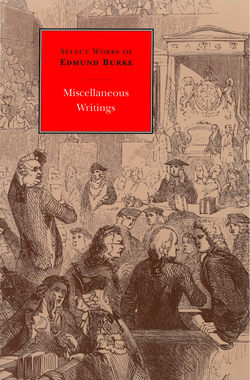Читать книгу Miscellaneous Writings - Edmund Burke - Страница 11
На сайте Литреса книга снята с продажи.
ОглавлениеSPEECH TO THE ELECTORS OF BRISTOL
[November 3, 1774]
Burke was elected in 1765 to the House of Commons from the borough of Wendover, which was “owned” by Lord Verney (its voters were his tenants and did his bidding). But in 1774, Lord Verney told Burke that financial difficulties prevented him from renominating the impecunious Burke in that year’s election. At the last moment, however, after the public poll (which went on for days) had already begun in Bristol, Britain’s second most important port, Joseph Harford and Richard Champion, merchants of that city, nominated Burke for one of Bristol’s two seats. Burke rushed to Bristol and delivered a speech on his arrival there. What is printed here, however, is Burke’s speech at the conclusion of the poll, after he had been elected. It has become the classic exposition of a certain view of the role of an elected representative.
To understand some of the things that Burke says in this speech, one will need a bit of historical background. In those days, each parliamentary constituency elected two members of Parliament. Bristol’s previous incumbents had been Lord Clare (a courtesy title, since, if he had been a nobleman, he could not have sat in the Commons), a Whig, and Matthew Brickdale, a Tory. But the Whigs were dissatisfied with Lord Clare, who had gone over to the court party, and thought they could take Brickdale’s seat as well in the 1774 election.
Their first nominee was Henry Cruger, Jr., who came of a prominent commercial family. Some of the Crugers had emigrated to New York, and Henry’s uncle, John Cruger, was the Speaker of the New York Assembly when that body elected Edmund Burke in 1770 as the colony’s agent at the British royal court. Burke was acquainted with him through official correspondence, and he was still the Speaker at the time of the election in Bristol.
His nephew, Henry Cruger, was a political radical, as radicalism was reckoned in that day, and some of his faction of the Whigs had sounded out Burke for the second candidacy. When the two of them met in Burke’s home in Beaconsfield, however, it became clear that they had important differences in political philosophy, and Cruger declined to stand for election with Burke. Burke’s last-minute nomination was the result of Lord Clare’s suddenly withdrawing on the day the poll opened, because he had been assured of a safe seat in another constituency. Harford and Champion, men of more moderate views than Cruger’s, now nominated Burke and urged him to come at once to Bristol.
Cruger was easily elected, but Burke won only after a closely contested poll. Brickdale, following a custom of losers still practiced to the present day, sought to have the election results nullified on grounds of fraud. A large number of those who had voted, he alleged, were not freemen of Bristol and therefore not entitled to cast a vote. He petitioned the House of Commons not to seat Burke; a committee held hearings and reported in Burke’s favor, and the House accepted its recommendation.
The important part of this speech, however, is Burke’s declaration of the independence that an elected representative ought to enjoy in Parliament. He not only stated his view but acted on it, in ways which his Two Letters on the Trade of Ireland, printed below, illustrate. One may well believe that on the issues on which Burke acted contrary to the wishes of his constituents, he was right and they were wrong. But the discontent he caused in them made it obvious that he could not win in the election of 1780, so he withdrew from the poll and accepted a safe seat from his parliamentary patron, Lord Rockingham, which he held until his retirement in 1794.
